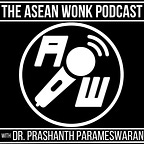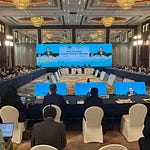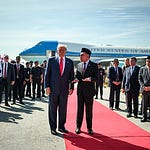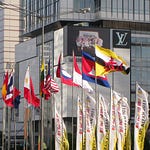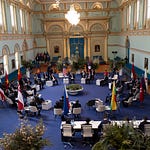Our guest today is Professor Dewi Fortuna Anwar who has several affiliations including as research professor at the National Research and Innovation Agency in Indonesia known as BRIN. She's regarded as one of Indonesia's leading foreign policy analysts. She's held several stints within the Indonesian government and is renowned for her writing and scholarship on a number of areas including Indonesia's foreign policy, democratization, and issues in Southeast Asia and ASEAN. She's taught and held fellowships across Indo Pacific capitals, including in Singapore, Japan and the United States.
We'll start our conversation talking about how to think about Indonesia's incoming new president Prabowo Subianto's foreign policy and security outlook, including U.S.-China competition as he leads the world's fourth largest country, third largest democracy, and largest Muslim majority nation. Make sure you watch, listen, and read the full episode to hear us talk through a range of other subjects including his likely foreign policy approach on specific issues and relationships, regional flashpoints including the South China Sea and Myanmar, and much much more.
Note: The transcript that follows the above free clip preview has been lightly edited for clarity and organized into sections for ease of quick browsing. For all ASEAN Wonk Podcast episodes, full video and audio podcasts, along with edited and sectioned transcripts as well as block quotes, will be a premium product for our paying subscribers, but we will include a short free transcript preview and a clip for all readers to maintain accessibility. Paying subscribers can find the rest of the full transcript and the full video podcast right below the paywall. If you have not already, do consider subscribing, and, if you have already done so, do consider forwarding this to others who may be interested. Thank you for your support as always!
INDONESIA FOREIGN POLICY IN CONTEXT
So Ibu Dewi, welcome to the ASEAN Wonk Podcast and thank you for joining us. With the media focus now overwhelmingly on Prabowo and the future with his inauguration as Indonesian president on October 20th, I'd like us to first start by getting your thoughts as a longtime observer and practitioner as well of Indonesia's foreign policy. How do you think about Jokowi's legacy in terms of foreign policy, geopolitics, and geoeconomics? I guess the sort of one-liner that's often thrown around is that he's been mostly a domestic-focused and economic-centric leader in Indonesia. He's kind of stuck to this notion of bebas-aktif or kind of free and active foreign policy. But frankly, there have also been some really notable developments, you know, an upgrade with the United States in terms of its relationship, Southeast Asia's first high speed rail project that's China-built, Indonesia being a sort of major nickel giant as well: that's been a big story that's come out in the headlines. But as somebody who's observed Indonesian foreign policy for decades, how do you contextualize this legacy of Jokowi before we get to Prabowo?
Dr. Dewi Fortuna Anwar: Yeah. I think as far as most of Indonesian observers are concerned, I will say that Jokowi's legacy will have a very mixed grade. Good grade mostly on economics, terrible on politics, particularly on democracy; so-so on foreign policy.
He achieved great results with the G-20 [Indonesia’s chairmanship in 2022] that after the fallout after the Russian invasion of Ukraine. There was a real concern that the G-20 will not even meet or would or would not be able to convene with all the major players. And that if they did convene that they will not be able to come up with a consensus to have a joint leaders declaration. And Jokowi then stepped up to the front and he did a very personal foreign policy then, visiting both Ukraine and Russia, bringing all the various parties together and managing to get the G-20 back on track as a primary economic and financial grouping and not a political grouping and make everybody focus on that. So he was lauded for that achievement.
Then Indonesia's ASEAN chairmanship [in 2023] is also so-so. There were a lot of expectations. There are remarkable milestones we've reached on Myanmar and on the South China Sea. But clearly, this is unrealistic expectation because the South China Sea cannot be resolved overnight. There were some developments, but not as much as we would expect it. And then on Myanmar, in fact, there's not been much development. It's a real disappointment.
But the prime policy of Joko Widodo he will be remembered mostly is for missing out a lot of multilateral forums that were not related to economics. He attended all the ASEAN hosted meetings. But he never went to New York for the UN General Assembly. He never attended any of the NAM summits or the Organization of Islamic Corporation summits and so on.
So, yeah, he will be considered to be successful in bringing foreign investments, particularly Chinese foreign investments. Indonesia joined the BRI. Indonesia also is part of the Asian Infrastructure Investment Bank. But so people look at Indonesia. Oh, it's becoming really part of the China bloc. A lot of the investment, particularly on high-speed rail, and then the flagship is the smelters for down-streaming. But at the same time, when there was a lot of news that Indonesia will be joining the BRICS – the new newcomers, you know, together with other countries like including Saudi Arabia and Malaysia is trying to join BRICS – everybody was surprised that Indonesia declined and has made it very clear that it will not be a party to BRICS. In fact, Indonesia has taken a very serious step to qualify for membership in OECD. So this is an interesting dynamic. And so it's as you mentioned, that is nonalignment. It's not just about geopolitics, but it's also about geoeconomics as well.
PRABOWO’S FOREIGN POLICY WORLDVIEW
ASEAN Wonk: Great. That's a terrific summary and analysis. So you mentioned this kind of “so-so” record on foreign policy in particular. And I guess moving on to Prabowo, there's obviously going to be some elements of continuity with respect to Indonesia's free and active foreign policy. At the same time, Prabowo also comes into this role with a large number of international relationships that he's cultivated. He's a known quantity, even though he's seen as being a little bit unpredictable. He's not afraid to speak his mind also on a number of international issues, and he's gotten quite an early start because he is a sitting defense minister, he's able to visit some of these regional capitals. So lots of focus on his recent visits including to China, France, Japan, Malaysia, Russia, Serbia, Turkey. How are you thinking about this kind of mix of continuity and change that Prabowo could bring to Indonesia's foreign policy? And how would you suggest we think about that in terms of the worldview that he brings as a personality to Indonesia's foreign policy?
Dr. Dewi Fortuna Anwar: Yeah. Jokowi and Prabowo are two very different personalities. Just in terms of the background, Jokowi is a small-town man with very little international exposure before his entry to national politics. Prabowo, on the other hand, lived most of his life overseas during his childhood. He had a very, very peripatetic education as well, following his father during his political exile. Prabowo comes from a very old established elite family, well, very well-educated. And so he's lived overseas, been educated not just in Tunisia but in fact mostly in Western capitals. So he's very cosmopolitan and very well-read, and he speaks several foreign languages. So just from that background alone, you know, we can imagine that Prabowo is much more comfortable in an international setting.
Secondly, his military background, military training, including his training in the US, that also means that security is something that is very important to him. He will have a very specific worldview when it comes to national security defense and so on. So he's been part of the establishment during the New Order period. So he's obviously also inherited some of the New Order view about security, comprehensive security. But also, Prabowo has also been known to be extremely nationalistic, more strident nationalism. Sometimes he came out as being a bit xenophobic in the past.
So we'll expect him to pay more attention also to issues pertaining to defense and security, including not just non-traditional security issues, which seems to be the focus by a lot of Indonesian governments. But also now the rise of traditional security threats, whether we are in a hot peace or a cold war, geopolitical rivalry and the South China Sea issues, Russia-Ukraine, the Palestinian issue. I think he will be much more interested in looking at this, than he will be commenting on it. And from past attempts, yes, he as minister of defense, he has been attending the Shangri-La Dialogue, and he's come up with some of his opinions, some of his unscripted views as well about how to make peace between Russia and Ukraine and so on.
So geopolitical issues will be of more concern to Prabowo than to Jokowi. Jokowi maybe looked at the world…he understands international relations are important, but he takes it as a background. It's not something that he was particularly interested in personally. While his focus was very much on economics and maybe geopolitical concerns are just regarded especially as background noises. But for Prabowo, I think he'll want to shape that also. And he has expressed his views about US-China rivalry that in that sense expressing a very Kantian perspective hoping that the great superpowers will shoulder equal responsibility as great powers have great responsibilities to ensure peace and stability. And Prabowo, in his various speeches, believes that both the United States and China, which are both great civilizations, which have contributed much to civilizational development, will continue to be responsible and will not try to harm the international environment which we all depend on. So, as I said, there is this realist perspective on the one hand about power politics and the threats of big countries dominating small countries and always castigating Indonesia for being weak. But at the same time, this great you might say idealism that major powers will have big thoughts and will share responsibility for world peace.
US-CHINA COMPETITION
ASEAN Wonk: I really like that interesting mix that you mentioned about realism and idealism. And on this sort of topic of US-China competition, as you know, it's really hard to get away from this topic whenever we're talking about any Southeast Asian country, but especially Indonesia, given its global and regional weight. I'm wondering, in terms of this kind of competitive environment between the United States and China, obviously for Indonesia, like many other Southeast Asian countries, that competition will also be about how does Indonesia realize its broader interests. That's about not just the United States and China, it's also the regional environment, the global environment. And I mentioned some inroads that we've seen on both the relationships between the United States and China for Indonesia. On the US side, the upgrade to the comprehensive strategic partnership, Garuda Shield becoming Super Garuda Shield, so some interesting developments there. On the China side, some interesting economic developments, including in critical minerals and infrastructure, but also challenges when it comes to the South China Sea. How do you see this relationship and Indonesia's environment of US China competition playing out in the coming years under Prabowo? Because there's a tendency in the headlines to look at episodic datapoints. So one is this often widely cited survey by the Institute of Southeast Asian Studies that showed when you look at certain countries in Southeast Asia and their approach whether they would if they were forced to choose – which no one wants to do – relative to the United States and China, I think Indonesia registered a nearly twenty percent decline when it came to the choice of the United States relative to China, and there's a whole conversation about how much of that is really about US-China competition relative to other issues like Gaza, for example, which is obviously factored into some of Southeast Asian countries' calculations. So how do you see Prabowo approaching US-China competition, and what kind of scenarios do you envisage given his, you know, active approach and his very sort of public views about this area and subject?
Dr. Dewi Fortuna Anwar: Well, I think Southeast Asia will not want to see a US-China convergence. A “G2” is just going to be as damaging as an open conflict right?…. [[Note: This is the end of a free preview podcast, with the full version in an earlier post published on September 12, 2024 available to our paying subscribers. This is not meant to serve as new content and is part of our free preview content within the dedicated website podcast section].


